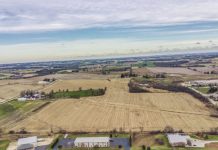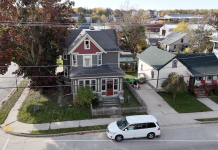West Bend, WI – Dave Bohn was born just a few months after the stock market crash in 1929. He grew up during the Great Depression in the 1930s on a farm just south of West Bend on Highway P. In addition to having dairy cows and growing grain, his parents raised chickens and sold eggs. Here’s a story Dave wrote about his favorite summer pastime:
When I was a boy, I lived for baseball. The driveway into our house from Hwy 55 (now, Hwy P) was made of gravel that had many stones the size of a big marble. My brother, Tom, and I would take an old broom handle to use as a bat and toss a stone up in the air a little way. As it dropped, we’d try to hit the stone as it fell in line with the swing of our “bat”. We spent lots of time doing this when we were growing up and got pretty good at it. Later on, when we played on League teams, Tom could really hit the home runs. To this day, he attributes his home runs to hitting the gravel stones in our driveway as a boy. I was a good hitter myself but could never hit the long ball as my brother could.
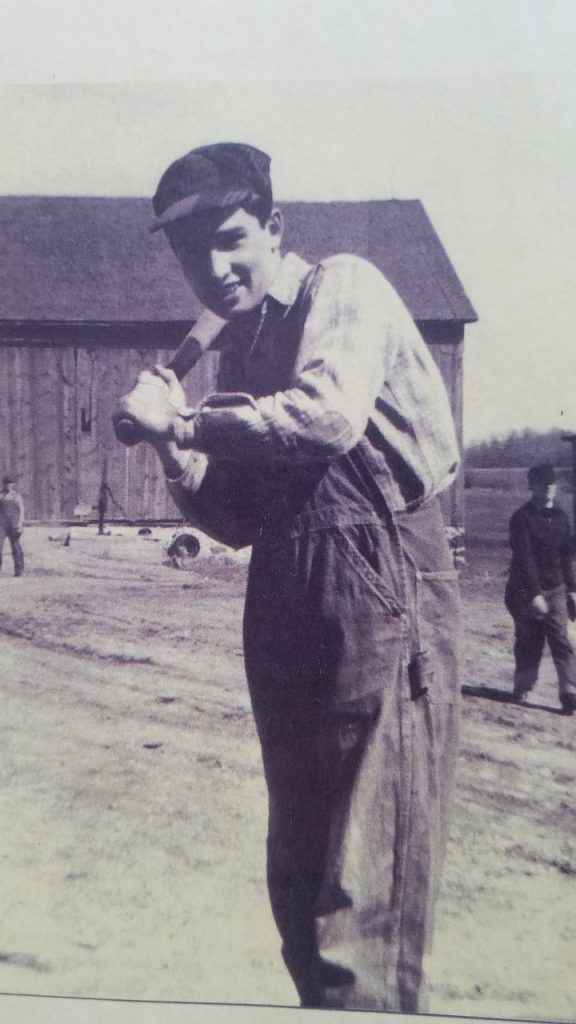
Being big baseball fans, Tom and I collected pictures of all the Big League players from Wheaties cereal boxes. On the cereal box, one entire side was a picture of some Big League baseball player, like No-Hit Johnny (Vander Meer) who was the only pitcher to this day to pitch two consecutive no-hitters.
Click HERE and subscribe to FREE local news at
Washington County Insider on YouTube
We cut out the side of the box with the players’ pictures on to collect them. We ate lots and lots of Wheaties at that time because we wanted to collect all the players’ pictures. We would tell our mom which players to look for and buy those cereal boxes. My brother Tom and I did collect quite a few of these pictures but I don’t know what happened to them. The last I saw them, they were in the attic at home.
On our farm, Tom and I spent hours and hours playing baseball with our cousins, Jim, Gene, and sometimes Norman Bohn, when they’d come for a visit. Gene had baseball in his head all the time and we would play when the cows were being milked in the evening. Home Plate faced our barn and when my brother hit the ball, it oftentimes would hit the roof of the barn. Once in a rare while, he would send the ball sailing over the roof of the barn and it would end up in the cow yard on the other side of the barn. Someone would have to go look for the ball then and oftentimes, it had landed in a pile of cow manure. Even with that, we were all happy though to see that ball go sailing so high.
We never wore shoes in the summer and our baseball field was near the chicken feeding area on our farm. We had lots of chickens on our farm and Home Plate was especially close to the feeding area. Chickens are not the cleanest animals and in the summer without shoes on, we oftentimes did make contact with chicken droppings. Our cure for this was to find a grassy place, rub our feet until we thought they were clean enough and go on with the game until it would happen again. Sometimes, the ball would roll right into this “little problem”. This called for a hands–on cleaning. It would happen quite often, so it just became part of the game.
In the late 1930s and early 1940s, I was a big fan of the Chicago Cubs baseball team. I knew all the players, as there wasn’t a Big League team in Milwaukee yet. At that time, they didn’t broadcast too many games on the radio as they were being played. But they did have a replay of the game with the main parts of the game only. By just announcing the results of each play, I guess they got the whole game down to less than 30 minutes. This was on the Chicago radio station, WIND. It was on at 5:45 in the evening and my brother, Tom, and I would sit in the kitchen by the radio to listen at that time. The Cubs were not good then, but I got to like some of them. I guess my favorite was Frank Demaree. He played with the Cubs in 1932-1933 and 1935-1938. He wasn’t the best, but he did hit home runs and I liked those kinds of players.
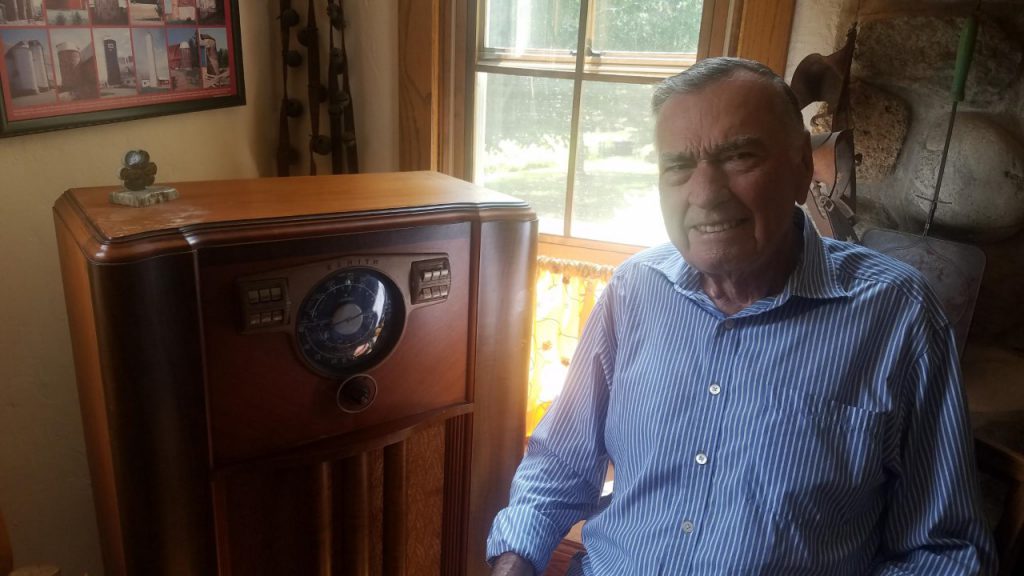
When I was about 16 years old, I started playing softball with different teams in the area. I played on the Corky’s Tavern team for a few years. Corky’s Tavern was located on the corner of Pleasant Valley Rd and Hwy P (currently Pleasant Valley Pub). I played in the outfield and then I started pitching. I was a pretty good player and a good pitcher. The Werner boys and other farm boys from the area were also on the team. We played with other teams from the little burgs in the area. Since we weren’t in the West Bend City League, we usually played our home games at Tomah’s Resort near Little Cedar Lake. After a while, they loosened up the restrictions in West Bend and the farm teams could use the West Bend ball field.
I also played on the Hwy 55 team, which was in the West Bend City League. It was the same team that Dad and his brothers had played on in their younger days. Dad wanted me to play on the Hwy 55 Team because he wanted me to continue with the family tradition. Hwy 55 is now Hwy P and was the highway our farm was located on.
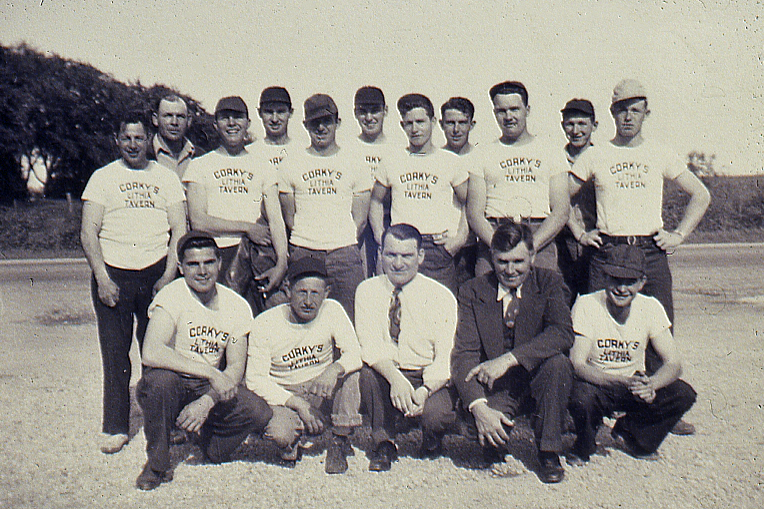
At some point during this time, the Hwy 55 Team got a sponsor, and the name was changed to Young’s Bar. Young’s Bar was on the south side of downtown West Bend. The back bordered the river and the front faced Main Street. I played with them for maybe three years. Most years with Young’s Bar, we had a pretty good team. This was fastpitch softball. Now, most of the softball games are slow pitch. I was the pitcher and Richard Schuetz was the catcher. We did win the championship one year for all of the West Bend Leagues.
At the same time that I played in the West Bend City League, I also played in the Dairyland League on the St. Lawrence team. I met my lifelong friend, Harold Krebs, during this time. The St. Lawrence team played on Sunday afternoons and the West Bend league played on Tuesday nights, always under the lights at Regner Park. This was all before I went into the Army, so I was still a teenager. I played a lot of ball back then.
After playing with Youngs Bar, I joined a team sponsored by Zinke Farms. I always pitched for that team. Our team was pretty good and we won the championship one year. I stayed pitching for that team for a few years until I got drafted to the Army in 1951.
After I was discharged from the Army, I played some ball, but not as much as before. I suppose I was older and had more responsibilities after I returned from the service. But those days of playing ball on our farm with a broom handle as a bat and the early days of playing ball with the West Bend area teams remain a great memory for me.


